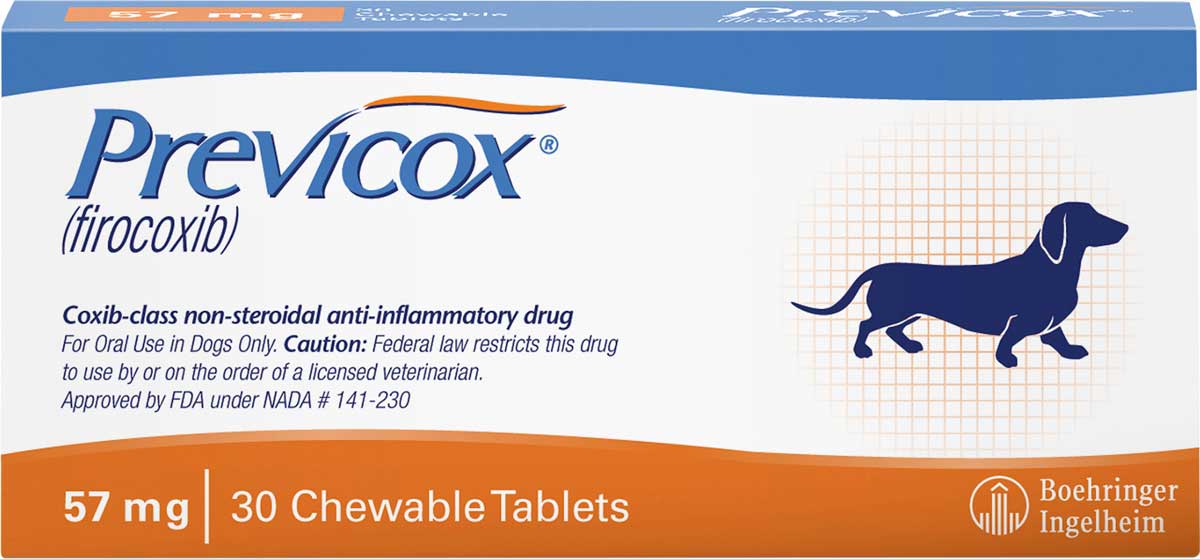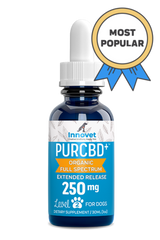- What is Previcox for Dogs?
- What Benefits Are in Previcox For Dogs?
- Osteoarthritis in Dogs: Signs and Symptoms
- What To Discuss With Vets About Previcox Firocoxib
- Previcox Side Effects In Dogs
- Previcox Dosage For Dogs
- Is Previcox The Only Choice For Treating Osteoarthritis in Dogs?
- Natural Alternatives To Previcox
- What Else Should I Know About Previcox Firocoxib?
- Previcox: Should I Give It To My Dog?
Having a dog is like having a best friend. They love following you around and hanging on to your every word and movement.
However, all of a sudden, your pet is suddenly tired and not moving as quickly as they used to. This is definitely concerning to dog owners that are used to their dog being active and outgoing.
Like humans, dogs are susceptible to the conditions of aging. For example, many older dogs begin to develop osteoarthritis. Osteoarthritis is a degenerative joint disease that is caused by joint inflammation that becomes chronic. Dogs that have osteoarthritis might suffer from discomfort, pain, and general malaise.
Sadly, this condition is chronic and has no cure. The good news is that there are ways to slow the progression of the disease, ease pain and discomfort, and help with managing other symptoms.
What is Previcox for Dogs?

The drug called Previcox is a class cyclooxygenase inhibitory NSAIDs (non-steroidal anti-inflammatory drugs) and contains the ingredient firocoxib. Other class cyclooxygenase inhibitory NSAIDs may be associated with gastrointestinal or kidney issues.
However, these drugs may affect renal perfusion, existing renal cardiovascular complications, renal gastrointestinal, and hepatic procedures. The drug Previcox may be prescribed to treat osteoarthritis in dogs.
Previcox can block the nerves that are causing the pain and inflammation associated with soft tissue and orthopedic surgery in dogs that are suffering from osteoarthritis. Previcox should be monitored in patients requiring adjunctive therapy.
Surgical procedures/anesthetic drugs may affect the effectiveness associated with Previcox. Vets may use fluids during surgery to decrease potential renal complications when using NSAIDs. Monitored NSAIDs may inhibit the prostaglandins that maintain normal homeostatic function.
Previcox is also a protein-bound drug. For dogs, commonly used protein-bound drugs include cardiac, anticonvulsant medications, and antiepileptic drugs.
Protein-bound drugs may also affect renal perfusion approach, concomitant therapy, and other forms of treatment. Concomitant diuretic therapy is often used if a dog suffers from heart failure.
What Benefits Are in Previcox For Dogs?
The chronic disease of osteoarthritis causes joint pain and inflammation in the most commonly used joints. For example, it is often found in the spine, wrists, elbows, knees, and hips. Because it is progressive in nature, the pain and inflammation associated with soft tissue and orthopedic surgery can often worsen over time.
Previcox therapy is prescribed for the control of pain levels, increases the dog's ability to move without as much discomfort, and lessens the amount of inflammation in the body.
Veterinarians also prescribe Previcox firocoxib for oral administration in dogs to help deal with postoperative pain and inflammation.
This is common after orthopedic surgery. It will be up to the vet and the health of your pet at the time of soft tissue surgery, but class cyclooxygenase inhibitory NSAIDs may be associated with easing postoperative pain and inflammation.
The benefits of Previcox are:
- Quick acting results after taking
- Tablet for easy administration
- Suitable to be given with or without food
- Lowers pain levels and inflammation
- Suitable for dogs over 12.5 lbs.

Osteoarthritis in Dogs: Signs and Symptoms
Figuring out if your dog might have osteoarthritis is achieved by monitoring their health closely for any signs and symptoms of the disease.
They could have one or all of the symptoms below:
- Licking joints
- Walking abnormally
- Sensitivity when touched in joint areas
- Stiffness
- Less interest in their normal play and activities
Pet parents can usually tell when something is wrong with their dog. A normally healthy and active dog taking a nosedive in energy and interest is a huge indicator that something is different and concerning.
No pet parent wants to see their ordinarily happy and energetic pet become uncomfortable and listless.
It is best to take your furry friend to the vet as soon as possible to get a professional opinion. A trusted vet can give a thorough exam and run any tests that they deem appropriate to provide you with the answers that you need.
They would be the best source to figure out if our pet has osteoarthritis, soft tissue surgery, or some other underlying medical condition.
What To Discuss With Vets About Previcox Firocoxib
If your vet diagnoses your dog with osteoarthritis, then they will come up with a treatment plan that they recommend. This may include diets, activities, and medications that will support your dog's treatment of osteoarthritis.
As mentioned previously, there is no cure for osteoarthritis. However, there are some treatment options that can slow the progression and help with the painful symptoms that are part of the diagnosis.
This does come with a list of possible side effects. It is important to speak up for your pet and talk about concerns that you have about giving this anti inflammatory drug (NSAID) to your dog as a treatment for osteoarthritis.
Some things that should be discussed are your pet's medical history, diet, and any side effects that you are especially worried about. It is important to discuss these things with your trusted veterinarian as they will know your dog's full medical history.
Also, we always recommend that you do your own research into medications as well, so that you can make the best decision you can on behalf of your dog. Pet parents always worry about their dogs, and it makes total sense to want to know every possible benefit and risk.
Previcox Side Effects In Dogs
The medication Previcox firocoxib is prescribed as a chewable tablet by veterinarians (store at room temperature). It is an anti inflammatory drug (NSAID) and does come with possible side effects that should be known by any pet owners that may be giving their dogs this medication.
Sadly, dogs have more side effects to worry about than humans. Their bodies and biology are inherently different than humans, and that is a big reason why their side effects with NSAIDs can be worse than the effects on people.
Some Potential Previcox Side Effects on Dogs Are:
- Allergic reaction
- Kidney health problems
- Gastrointestinal discomfort
- Nausea
- Vomiting
- Diarrhea
- Increased Urination
- Jaundice (yellowing of gums skin)
- Decreased food consumption/liver issues
- Bloody stools
- Scratching/unexpected weight loss
Sudden weight loss, redness, scabs, or scratching are the most prominent warning signs that something is wrong with your pet.
If they have been treated with Previcox firocoxib and suddenly lose weight, it is crucial to get them to the vet as soon as possible.
This is because sudden weight loss is an indicator that your dog may have developed an ulcer from taking this non-steroidal anti-inflammatory drug.
An ulcer in a pet's stomach can cause significant gastrointestinal distress and even lead to severe damage to the inner lining of the stomach. Side effects of Previcox are quite worrisome for pet owners. Sensitivity to drug-associated adverse events varies for each dog.
It is imperative to note that any pregnant, lactating, or breeding dogs should not use any non-steroidal anti-inflammatory drugs, as they could cause severe adverse reactions.
Also, any puppies that are under seven months of age should not be taking Previcox as they are usually too small and under-developed to take this medication safely.
Dogs that have compromised immune systems should also likely not take Previcox or only under the strict supervision of a veterinarian. This is because their odds for side effects are higher than most and it can make their health worse.
As always, listen to the advice of your veterinarian since they have all the necessary data on file. Keeping a closer eye on them for a while will be wise to ensure they are not having adverse reactions.
Previcox Dosage For Dogs
This non-steroidal anti-inflammatory drug is given as Previcox chewable tablets that are convenient for daily use. It is essential to verify the recommended dosage with the veterinarian to make sure that you are giving your pet the correct amount. Giving them too much or too little can be a problem for your furry friend.
Vets will often recommend giving them the dosage on the prescription for as little time as possible. This will help with managing pain in a responsible way. Giving them what they need only while they need it can be helpful in lessening the possibility of adverse reactions or issues from the chewable tablets.
The most commonly suggested dose of Previcox chewable tablets for dogs is 2.27 mg/lb of body weight once daily and roughly two hours prior to surgery. The typical dosage is 57 mg - 227 mg, and both would be enough for a 10-pound dog.
Your veterinarian will let you know how many Previcox chewable tablets to give your furry pal and when they should be administered.
Small dogs (less than 12.5 pounds) tend to get a 57 mg dose where larger pups may need more. Once you've exceeded the 57 mg dosage, contact your vet for necessary appropriate monitoring procedures.
An interesting aspect of the chewable tablets is that the Previcox tablets are available in a BBQ flavor. Giving them medication along with food is a smart tip as it can lessen the possibility of nausea after taking medicine. In half-tablet increments, Previcox tends to have few side effects.
If you forget a dose, it is crucial that you do not give your dog two at once to make up for the missed dose. Just skip it and give them the next dose as recommended.
This is because your dog can overdose on Previcox firocoxib if given too much (more than 2.27 mg/lb.). If a pet owner accidentally gives their dog a double dose, they should discontinue therapy and contact their veterinarian immediately.
This could be life-threatening and is why it is so imperative not to give them too much. Only stick to the prescribed amounts of firocoxib on the schedule that is recommended.
Giving your pet chewable tablets without a veterinarian's guidance is never a good idea. It is in your pet's best interests to only have prescriptions given under the orders of a veterinarian.
Is Previcox The Only Choice For Treating Osteoarthritis in Dogs?
Previcox chewable tablets can treat osteoarthritis for some pets quite successfully. It is a commonly prescribed medication for pets that have this chronic health condition and does work well for many dogs that are suffering from pain and inflammation associated with osteoarthritis.
However, it is not the only choice for treating osteoarthritis in dogs.
Pet owners that don't want their pooch to experience any adverse reactions or that cannot give their dogs chewable tablets do have other options.
Many vets will recommend more exercise for your pet as a part of a lifestyle change after being diagnosed with a chronic joint condition. Also, losing weight can help pets that have this disease. This is because it is even harder for overweight dogs with osteoarthritis to move.
Changing your pet's diet and helping them lose weight can increase their ability to get up and move. There are even all-natural and organic options that can help dogs suffering from osteoarthritis.
Natural and organic alternatives are an excellent choice for pet parents that don't want to give their pet medicines that can have adverse reactions.
Natural Alternatives To Previcox
If you would like to try natural alternatives to Previcox chewable tablets for your dog, there are some outstanding options. A popular choice that dogs can use is CBD. CBD Oil for Dogs is available for dogs that have inflammation and pain from osteoarthritis.
It may also be used for a long list of other health issues. CBD studies have shown it may be helpful in reducing anxiety, assisting in cancer recovery, reducing nausea, and even lessening seizures.
This is true for both humans and dogs. For older pets that have pain and inflammation associated with osteoarthritis, it could be a fantastic option that is free of damaging side effects.
We offer Hemp Dog Vitamin chews that are made in a chewy form that is great for senior dogs. These treats are soft and more manageable for older dogs to eat and chew. They also come in a wide variety of flavors, so that you can find a flavor that your dog loves.
There is no THC in these products, and that means you don't need to worry about your pet getting "high" - there is no high at all. Also, there is no laundry list of side effects.
It is an all-natural option that brings benefits to dogs without all of the worrisome health concerns that some prescriptions have. Adding omega-3 fatty acids to your pet's food intake can also help with inflammation and pain and is a naturally occurring substance found in certain types of fish.
At Innovet Pet, we know all too well how hard it is to see a pet in pain. It is a harrowing experience that most pet owners have been through or will go through at some point as their precious pet gets older.
Dogs can have noticeably positive health changes in a short period of time with all-natural options. In fact, some dogs have better results with natural choices than they do with prescriptions.
What Else Should I Know About Previcox Firocoxib?
Can Previcox for dogs be used with humans?
No, humans should not be taking Previcox chewable tablets. It is specifically for use in dogs and their unique biology and needs only.
People should not take Previcox at all. If accidentally ingested by a person or another animal in the home that it wasn't prescribed for, it is essential to seek medical help right away.
Should I give my dog Previcox if they are taking other medication?
This is something that must be discussed with your veterinarian. They will be able to tell you if the medicine is safe for your pet.
It is vital to disclose to your vet any and all medications, supplements, and foods that they have been ingesting. This way your vet is fully informed and can help in advising you properly about whether or not you can give your pet Previcox.
What if I accidentally give my dog more Previcox than was prescribed?
This is a case where you should contact your veterinarian immediately. They can advise you of what to do next.
Also, note that you must not give your dog Previcox if they have ever had an allergic reaction to any NSAIDs before.
If they are allergic to aspirin or Tylenol it is not advised to give them Previcox.
In addition, any previous history of ulcers in the stomach means it is unsafe to give them to your dog as this can cause ulceration in the stomach.
Small dogs under 12.5 lbs and dogs that are taking other NSAIDs should not take Previcox.
Where Do I Buy Previcox?
Always get it from a veterinarian as a prescription.
It can be purchased online at various outlets, but this is dangerous. Only buy it from your veterinarian if they have prescribed it for your canine.
Is My Dog's Breed More Prone to Osteoarthritis?
Osteoarthritis can happen in any dog breed. It does happen more often in large breeds of dogs.
However, both large and small breeds of dogs can get osteoarthritis. It has more to do with the natural process of aging and some of the health problems that come from that.
How Does A Vet Diagnose Osteoarthritis?
A veterinarian will likely use various methods to check for osteoarthritis.
They will examine your dog to see if it has an abnormal walk or any other visible signs.
To accurately diagnose it, the veterinarian will typically give your pet an x-ray that will show inflammation and other symptoms of the disease in the joints.
In some cases, they may collect tissue from your pet to get laboratory tested.
Previcox: Should I Give It To My Dog?
This will be up to you and your veterinarian. It is a highly personal choice and one that you will have to consider carefully.
There is no doubt that Previcox works for some pets very well. This is why veterinarians prescribe it for dogs that have painful symptoms of the disease.
However, the high number of possible side effects can give some pet owners pause.
It is important to weigh the benefits and the risks of giving them Previcox and decide if it is best for your pet. Otherwise, all-natural products may be an excellent alternative to helping your pup without exposing them to the potential health consequences of taking prescription medication.















